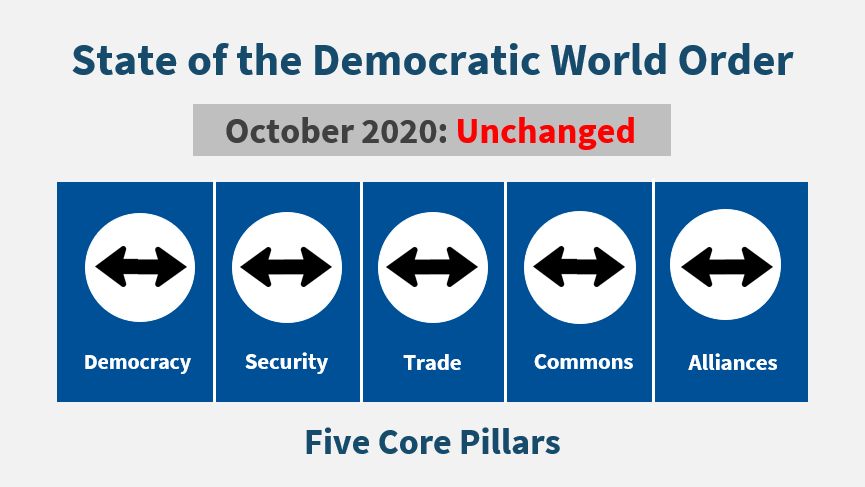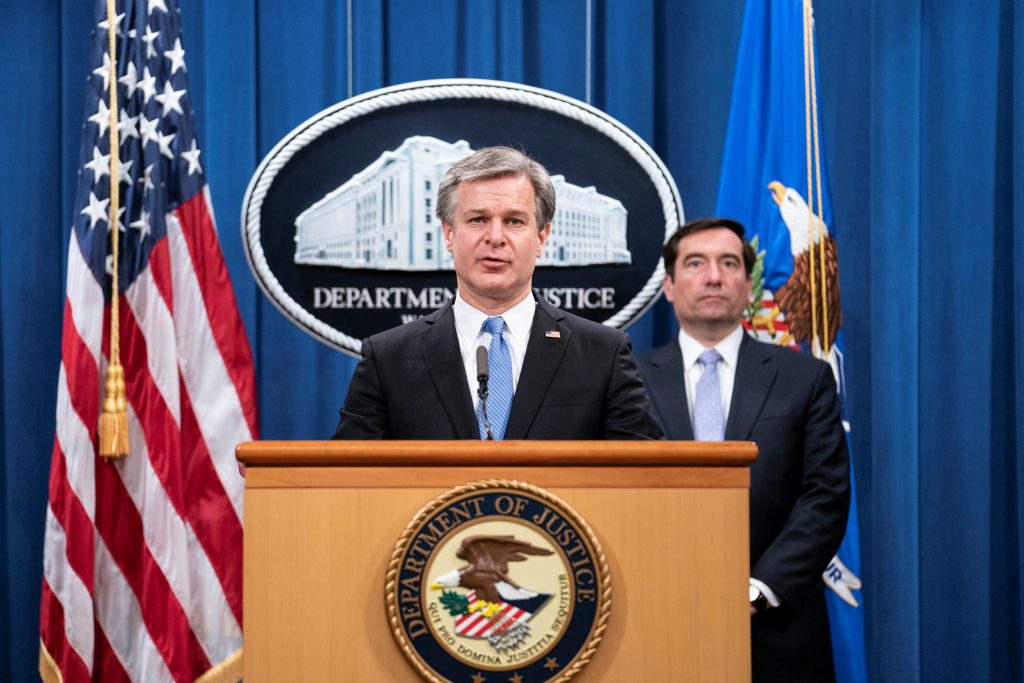NOTE: As the final outcome of the US presidential election becomes clear, this issue assesses the state of the democratic order for the month of October. We will analyze the implications of the election in next month’s issue.
Reshaping the order
This month’s topline events
US Election Meddling. As Americans began casting their ballots, US intelligence officials expressed concerns that foreign adversaries are again engaged in an effort to interfere in the US presidential election. The CIA assessed that Russia has conducted influence operations, likely directed by Vladimir Putin himself, aimed at raising President Trump’s reelection chances. Iran has also gotten into the act, reportedly sending fake emails to American citizens in a bid to benefit Vice President Biden.
- Shaping the Order. The ability to conduct free and fair elections, without foreign interference, is one of the key principles of the rules-based system. While the actual impact of their actions is uncertain, Russia and other foreign actors have brazenly demonstrated their willingness and capability to undermine the sanctity of elections in the US and other democracies.
- Hitting Home. As the outcome of the election unfolds, Russia will almost certainly seek to magnify its disinformation campaign to sow discord over allegations of voter fraud, instigate potential violence, and create public doubt over the legitimacy of the outcome.
- What to Do. The US should bolster its cyber security and counter-disinformation capabilities, while imposing meaningful penalties against Russia and Iran to deter future election meddling.
A Welcome Mat for Sudan. The State Department announced that it will remove Sudan as a designated state sponsor of terror, after the country’s transitional government committed to end support for terrorism and provide $335 million in compensation for previous attacks. With US backing, Sudan also agreed to normalize relations with Israel. The move clears the way for the US to lift sanctions and give Sudan access to international investment and development assistance.
- Shaping the Order. Sudan’s remarkable turnaround from a pariah state to a transitional democracy in just two years is a bright spot in a world that has been experiencing a steady democratic decline. Once accused of harboring terrorists, including Osama bin Laden, and committing genocide while its people suffered under the dictatorship of Omar Bashir, Sudan has taken dramatic steps toward becoming a positive force for regional security.
- Hitting Home. A more democratic Sudan could be a supportive partner for peace in a volatile region, diminishing the threat of terrorism against Americans and US allies.
- What to Do. Washington should follow through on commitments to provide economic aid for Sudan and bolster incentives for the country’s transition to democratic governance, while supporting the International Criminal Court’s efforts to hold Bashir accountable for his crimes against humanity.
India Tilts Westward. The United States and India signed a landmark new defense agreement that involves sharing military intelligence and ramping up strategic ties. The move follows a joint meeting in Tokyo of “the Quad” foreign ministers from India, the US, Australia, and Japan to work together to maintain a free and open Indo-Pacific and participate in joint naval exercises. Separately, India and the European Union discussed ways to deepen strategic cooperation at a summit in July.
- Shaping the Order. As the world’s largest democracy, India could play a pivotal role in shaping the future of a democratic world order. New Delhi’s tilt toward the West and desire to build stronger security and economic ties with other democracies could have meaningful impacts in the context of a rising China.
- Hitting Home. Closer links between India and the US could lead to greater trade and investment opportunities, directly benefiting US companies eager to gain access to India’s burgeoning market.
- What to Do. Washington should continue to encourage closer ties between India and leading democracies and pursue cooperation in the security, economic, technology, and other domains. At the same time, US officials should seek frank conversations on issues of concern, including India’s defense ties to Russia and new political restrictions on foreign NGO’s.
“As vibrant and pluralistic democracies with shared values, our nations have affirmed collectively the importance of maintaining a free, open, and inclusive Indo-Pacific. We remain committed to upholding the rules-based international order underpinned by the rule of law, transparency … and peaceful resolution of disputes.”
– Indian Minister of External Affairs Subrahmanyam Jaishankar

State of the Order this month: Unchanged
Assessing the five core pillars of the democratic world order
- Democracy (↔) – Attempts by Russia and Iran to meddle in the US political process reinforced concerns about the aftermath of the presidential election. In response to Russia’s poisoning of opposition leader Alexei Navalny, France and Germany announced their support for new EU sanctions against Russian officials. Thailand declared a state of emergency as pro-democracy protestors called for the resignation of Prime Minister Prayut Chan-o-cha, who came to power via a military coup in 2014. Belarus’ pro-democracy movement demonstrated its staying power amid intensifying repression by the Lukashenka regime.
- Security (↔) – Sudan’s recognition of Israel and commitment to end terrorism marks another significant positive step toward peace in the Middle East. Fighting escalated between Armenia and Azerbaijan over Nagorno-Karabakh, as Armenia sought security assistance from Russia under their mutual defense treaty. North Korea unveiled a new long range ballistic missile, which if operational, would be the largest mobile ICBM in the world. China ratcheted up military activity around Taiwan, sending warplanes into its air identification zone 25 times over the month.
- Trade (↔) – The European Union is considering new tariffs against Boeing after the World Trade Organization (WTO) ruled that the company was receiving unfair government subsidies. The US stood alone among 164 member-states in opposing a Nigerian candidate to be the new director general of the WTO, prompting criticism from several US allies. The UK and the EU agreed to continue trade talks aimed at avoiding damaging new tariff restrictions in the wake of Brexit.
- Commons (↔) – Japan and South Korea committed to carbon neutrality by 2050, joining the European Union which previously announced the same. Japan and South Korea committed to carbon neutrality by 2050, joining the European Union which previously announced the same. France, Germany, and the UK announced new lockdowns as the coronavirus continues to surge across Europe, as well as the US.
- Alliances (↔) – Foreign ministers from the US, Japan, Australia and India met for the second-ever Indo-Pacific Quad ministerial in Tokyo to discuss regional security cooperation, as Chinese Foreign Minister Wang Yi criticized this as an attempt to build an “Indo-Pacific NATO.” France recalled its ambassador to Turkey after a series of tense exchanges between presidents Turkish President Erdogan and French President Macron over a terrorist attack in France. Turkey also escalated its maritime dispute with Greece by sending a naval vessel to disputed waters.
Strengthened (↑)________Unchanged (↔)________Weakened (↓)
What is the democratic world order? Also known as the liberal order, the rules-based order, or simply the free world, the democratic world order encompasses the rules, norms, alliances, and institutions created and supported by leading democracies over the past seven decades to foster security, democracy, prosperity, and a healthy planet.
This month’s top reads
Three must-read commentaries on the democratic order
- Hal Brands writes in the American Purpose that the United States needs to reembrace the international liberal order in order to effectively compete with China.
- Anja Manuel, writing in the Financial Times, proposes that the US lead a new “Technology 10” grouping of democracies to cooperation on technology innovation.
- Laura Rosenberger, in Foreign Affairs, warns that Russia’s attempts to interfere in the election may be even more pronounced after election day.
Action and analysis by the Atlantic Council
Our experts weigh in on this month’s events
- Ash Jain and Barry Pavel, in a new Atlantic Council Issue Brief, analyze several possible 2020 election scenarios and their implications for US foreign policy.
- A recent article in The Guardian cites growing support in both the US and the UK for the D-10, a construct first proposed by the Atlantic Council.
- Cameron Hudson, writing in the New Atlanticist, analyzes what will follow in the wake of Sudan’s removal from the US State Sponsor of Terrorism list.
- Thomas S. Warrick writes in the New Atlanticist on the implications of Russian and Iranian interference in the US election.
- Ash Jain joined the Carnegie Council for Ethics in International Affairs to discuss the D-10, democratic cooperation, and rebuilding domestic support for American global leadership.
__________________________________________________
The Democratic Order Initiative is an Atlantic Council initiative aimed at reenergizing American global leadership and strengthening cooperation among the world’s democracies in support of a rules-based democratic order. Sign on to the Council’s Declaration of Principles for Freedom, Prosperity, and Peace by clicking here.
Ash Jain – Senior Fellow
Dan Fried – Distinguished Fellow
Jeffrey Cimmino – Program Assistant
Daria Boulos – Project Assistant
Anna Downs – Georgetown Student Researcher
If you would like to be added to our email list for future publications and events, or to learn more about the Democratic Order Initiative, please email AJain@atlanticcouncil.org.
Image: FBI Director Christopher Wray speaks during a virtual news conference at the Department of Justice in Washington, U.S., October 28, 2020 Sarah Silbiger/Pool via REUTERS
